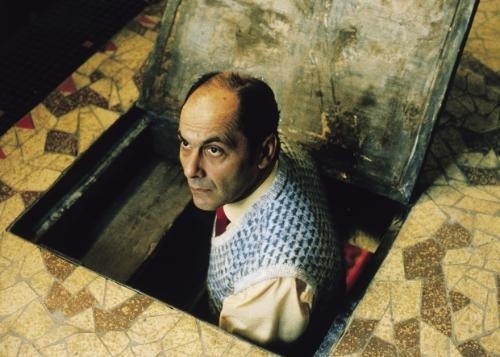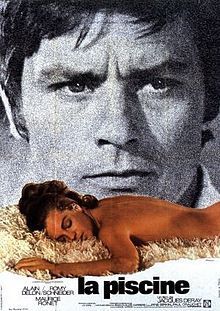I read something sometime recently that made me groan with the inevitability of it. Something about the decreasing popularity of French films in France. French audiences are demanding instead, quelle surprise, more fodder from the Big Country of philistines across the Atlantic. More bounce to the ounce, presumably: more guns, more explosions, more chases and other frenzied action, more brutality, more clichés.

It’s not that French film makers are immune to clichés. Judging by the posters and the blurb, plenty are riddled with them. But when they’re good, there’s still nothing quite like a French film. Movies like Un Air de Famille, for example, where we watch a group of beautifully observed individuals just interacting subtly and naturally, often warmly and humorously, where plot points and character arcs are so integrated into the whole rich tapestry of cinematic life that you don’t even notice them. France seems like one of the last places on earth where the indigenous film industry still bears an immediately recognisable stamp. So maybe not for much longer, then.
Last weekend it seemed that my wife and I stepped into a French film and became characters in a drama that unfolded around the 60th birthday of the friend I mentioned in the last post. His premature senility, as it was once known, lent the scenario the poignancy that the scriptwriter needed to lift it out of the commonplace.
Intercut with scenes of the preparations – and, being France, of course there would be some succulent close shots of food being chopped and cooked – is disparate footage to bring some of the players to the house where the drama will unravel. The now bearded good-looking son flying in to Lyon airport from his latest posting in Budapest; the daughter and her new partner speeding south from Normandy via Paris in a TGV; a car load of chattering friends from Bordeaux; another friend cycling down the Canal du Midi; a pair of expatriate Brits on the deserted A75, the ‘Meridian’ that cuts a swathe across the Massif Central from Clermont Ferrand to Bézier and Montpelier. The landscape they drive through looks notably dramatic under an ominous sky, which threatens to rain on the host’s parade. There is a glimpse of the distant viaduct with the lights on top of its seven huge pillars blinking in the gloom, followed by a closer look from the Air de Repos at the monumental structure’s giant strides across the valley of the Tarn.
Journey’s end is a fairly typical well heeled house of the Midi – with a big veranda at the front sheltered by a vine laden with grapes the colour of rosé, a gravel courtyard that separates the house from a discreet fenced-in pool and boules court surrounded by little outhouses where the wood and the wine are stored. The abundant grapes and a huge flowering oleander testify to the year-round mildness of the climate.
On arrival, the guests go up in dribs and drabs to one of the bedrooms, where the photograph album compiled by the daughter in the weeks leading up to the party is laid out on the bed. Among the bygone images of family and friends are some of the 50th birthday celebrations at the summer house by the Atlantic. The proof of the time-lapse is there in the characters’ silver hair and the wrinkles around their eyes. How we have all aged! Moist-eyed with nostalgia, they write their testaments to friendship in white ink on black paper and studiously avoid sentiments like, So sorry you’ve gone off your rocker prematurely, because we had some great times together in the past when you were all there and we could share a proper conversation.
And then, like many a French film of yore, out come the first of the aperitifs that will mark the next two days. As glasses are raised, the host takes his English friend’s hat off his head and puts it on his own, then promptly forgets all about it until his wife, now wearily accustomed to such pranks, removes it and returns it to its careful owner. After the initial aperitifs, the women – because it’s always the women who do the socially responsible thing – bring out the various dishes they have been preparing all morning long. While the host’s solicitous female entourage checks to ensure that he is remembering to eat, his male friends either josh him or avoid having to stand next to him with nothing really to say.

Between the midday meal and the evening buffet, people sit under the vine and smoke and chat about their families and interim developments, or wander over to watch a noisy gaggle of men while away the afternoon over repeated games of boules. Some of the pluckier guests follow the lead of their hostess by taking a swim in the pool that is surprisingly cold. But isn’t this the Midi, where swimming pools stay ever warm to compensate for the density of the people and their motorised traffic, for the Mistral and for the arid terrain?
With the advent of evening, more food and drink emerges from the bottomless kitchen to cater for the influx of les jeunes: the nephews (plus partners and offspring) of our host, who has by now retreated indoors to watch some match on the telly and to find a little quiet time in order to recover from being present for so many visitors. Very small children scoot about on plastic pedal vehicles. An angelic boy, who could have been lifted from an Italian Renaissance painting, burns his finger on the motor of his dad’s motorbike in the road outside and the strange English woman succours him with lavender oil and then a demonstration of EFT, which tempts others to try its apparent magical powers on their own deep-seated wounds.
Meanwhile the very old have arrived to add a fourth generation. The elegant mother of the host’s cousin and daytime carer (and his wife’s best friend) looks dapper in her navy blue suit and a trifle disorientated by the sheer number of guests. And as the host’s own father introduces his new partner to the multitudes, words are not needed to underline the poignancy of an octogenarian greeting a son and only child who is incapacitated with Alzheimer’s Disease.
The floodlights come on as the young men take on the older men for one last epic encounter at boules before the evening celebrations begin in earnest. The English couple secretly hope for a good dance to some good music, but the acoustic guitars have already come out and people settle down with their drinks under the soft lighting of the veranda to sing along to the poetic music of Georges Brassens and the less poetic music of lesser heroes from their youth. And there are stilted attempts to SingalongaBeatles, but only the two English guests know all the lyrics to ‘Yesterday’ and ‘Hey Jude’.
The film could end here or, after the violent nocturnal storm that somehow holds off until the other side of midnight, with the tearful departure the following morning of her father’s doting daughter – but it would need some kind of revelation or resolution that would cast light on why the host has been stricken with Alzheimer’s at such an early stage. Real life prevails in this case and people drift away, car by car, after the final round of drinks and food on Sunday. Back to the quotidian. And being real life, mysteries are unresolved and questions are unanswered.
Cue music and credits...
FIN